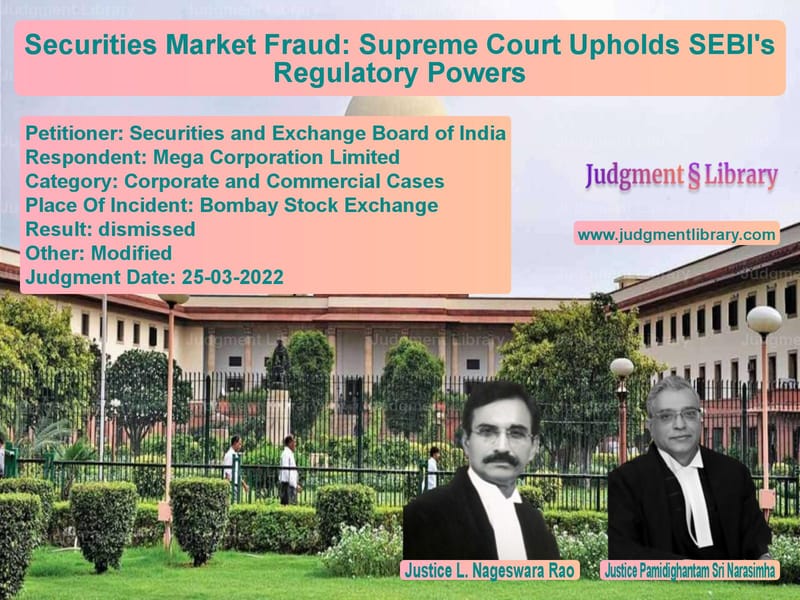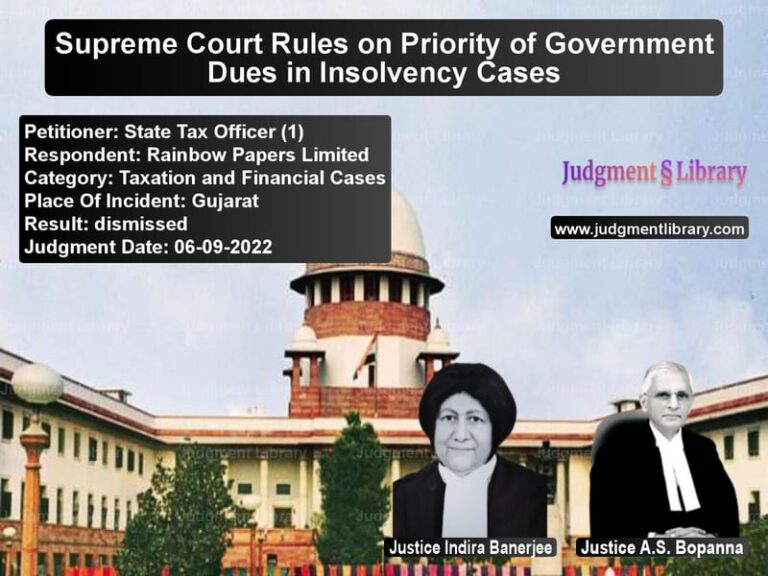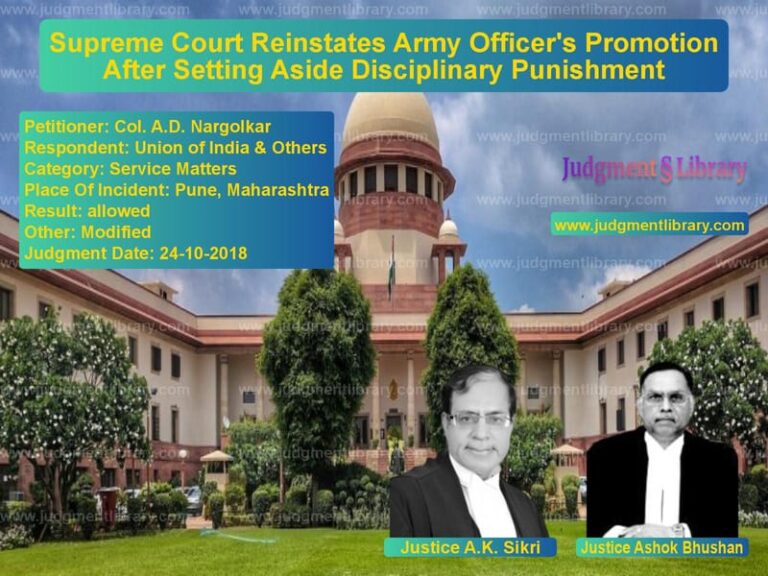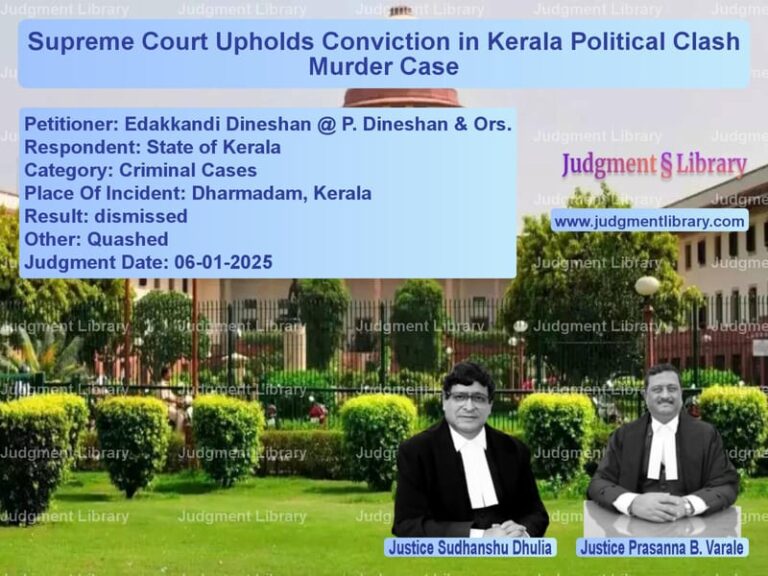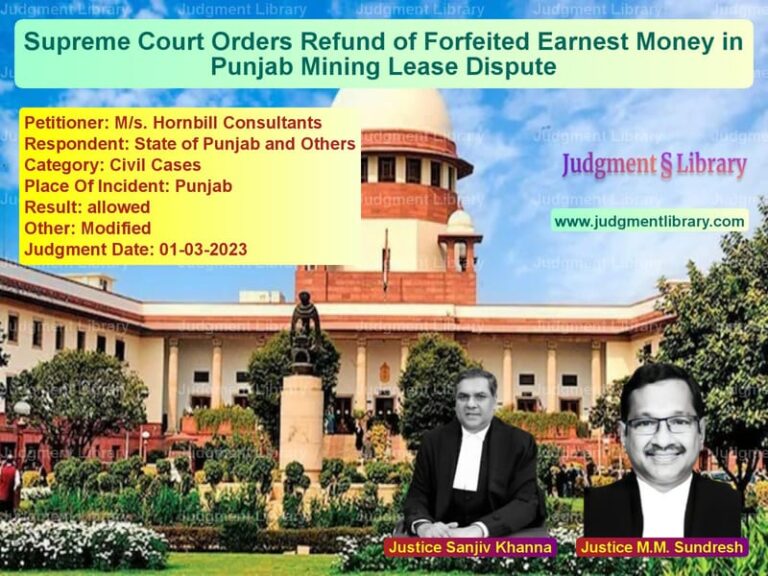Securities Market Fraud: Supreme Court Upholds SEBI’s Regulatory Powers
The case of Securities and Exchange Board of India (SEBI) vs. Mega Corporation Limited revolves around allegations of fraudulent trade practices in the stock market, including share price manipulation and misleading investor advertisements. The Supreme Court ruled on the legality of SEBI’s actions against the company, particularly regarding market access restrictions imposed as a penalty.
This judgment is significant as it clarifies the extent of SEBI’s powers under the Securities and Exchange Board of India Act, 1992 and reinforces the principles of fair trading and investor protection in the capital markets.
Background of the Case
The case pertains to the activities of Mega Corporation Limited, a company listed on the Bombay Stock Exchange (BSE), which was primarily engaged in radio taxi services and trading of shares. SEBI investigated unusual movements in the company’s share price and found evidence of artificial trading practices. Key events in the case include:
- 1996: Mega Corporation Limited was listed on BSE.
- January 2005 – September 2005: The company’s share price surged from Rs. 4.25 to Rs. 43.85, raising regulatory concerns.
- 2007: SEBI issued a show-cause notice alleging violations of the SEBI (Prohibition of Fraudulent and Unfair Trade Practices) Regulations, 2003.
- February 28, 2008: SEBI issued a final order restraining the company from accessing the capital market for one year and barring its directors from dealing in securities.
- October 15, 2008: The Securities Appellate Tribunal (SAT) set aside SEBI’s order, ruling that there was insufficient evidence of manipulation.
- March 25, 2022: The Supreme Court ruled on SEBI’s appeal against SAT’s decision.
SEBI accused the company of inflating profits, misleading investors through false advertisements, and artificially manipulating share prices.
Legal Issues Considered
- Whether SEBI’s restrictions on Mega Corporation Limited were legally justified.
- Whether the company’s advertisements violated SEBI’s regulations on investor protection.
- Whether the company engaged in fraudulent stock trading practices.
- Whether SEBI was required to grant the company an opportunity for cross-examination.
Petitioner’s Arguments (SEBI)
- The company engaged in artificial share price manipulation by orchestrating coordinated stock transactions.
- The company issued misleading advertisements regarding its expansion into forex and travel businesses, luring investors under false pretenses.
- The SAT wrongly treated each aspect of the case as an isolated event rather than a pattern of fraudulent conduct.
- There was no automatic right to cross-examination in SEBI’s regulatory proceedings.
Respondent’s Arguments (Mega Corporation Limited)
- The company’s increased profits were legitimate and not a result of manipulative practices.
- The advertisements about forex and travel businesses were factually correct and based on real agreements.
- The company had no direct connection with the traders alleged to have manipulated stock prices.
- SEBI’s refusal to allow cross-examination of key witnesses violated principles of natural justice.
Supreme Court’s Judgment
The Supreme Court bench, comprising Justices L. Nageswara Rao and Pamidighantam Sri Narasimha, upheld SAT’s ruling in favor of the company but set aside its general findings on the right to cross-examination.
1. SEBI’s Appeal Rejected Due to Lack of Sufficient Evidence
“The Tribunal has arrived at its conclusions based on independent facts and documentary evidence. We find no question of law warranting interference under Section 15Z of the SEBI Act.”
The Court ruled that SEBI had failed to establish direct proof of stock manipulation.
2. No Direct Evidence of Investor Fraud in Advertisements
“There is no material to prove that the advertisements were issued with a fraudulent intent to mislead investors.”
The Court found that the advertisements were linked to actual business developments.
3. SEBI’s Findings on Stock Manipulation Overturned
“The charge of manipulative trading in its own shares by the company fails due to lack of evidence connecting the alleged traders to the company.”
The Court ruled that circumstantial evidence was insufficient to hold the company liable.
4. No Absolute Right to Cross-Examination in SEBI Proceedings
“The Tribunal’s general finding that there is a right to cross-examine witnesses in all SEBI proceedings is set aside.”
The Court held that cross-examination is not required in every SEBI investigation but left the issue open for future cases.
Key Takeaways from the Judgment
- The Supreme Court reaffirmed that SEBI must provide concrete evidence when imposing penalties.
- The absence of a direct link between the company and alleged market manipulators weakened SEBI’s case.
- Advertisements promoting a company’s business expansion are not automatically misleading under SEBI regulations.
- The right to cross-examination is not absolute in SEBI regulatory proceedings.
Implications of the Verdict
This ruling has significant implications for securities regulation and market fraud cases:
- SEBI must ensure that its penalties are backed by substantial evidence.
- Companies must ensure that public advertisements accurately reflect business plans.
- The judgment clarifies that SEBI has wide regulatory powers but must apply them with due process.
Overall, this Supreme Court ruling strengthens investor protection while ensuring that SEBI’s enforcement actions are supported by robust evidence.
Petitioner Name: Securities and Exchange Board of India.Respondent Name: Mega Corporation Limited.Judgment By: Justice L. Nageswara Rao, Justice Pamidighantam Sri Narasimha.Place Of Incident: Bombay Stock Exchange.Judgment Date: 25-03-2022.
Don’t miss out on the full details! Download the complete judgment in PDF format below and gain valuable insights instantly!
Download Judgment: securities-and-excha-vs-mega-corporation-lim-supreme-court-of-india-judgment-dated-25-03-2022.pdf
Directly Download Judgment: Directly download this Judgment
See all petitions in unfair trade practices
See all petitions in Corporate Compliance
See all petitions in Company Law
See all petitions in Judgment by L. Nageswara Rao
See all petitions in Judgment by P.S. Narasimha
See all petitions in dismissed
See all petitions in Modified
See all petitions in supreme court of India judgments March 2022
See all petitions in 2022 judgments
See all posts in Corporate and Commercial Cases Category
See all allowed petitions in Corporate and Commercial Cases Category
See all Dismissed petitions in Corporate and Commercial Cases Category
See all partially allowed petitions in Corporate and Commercial Cases Category

